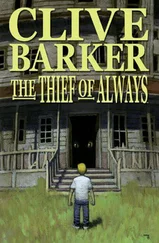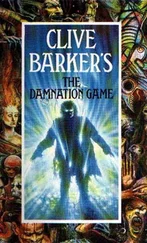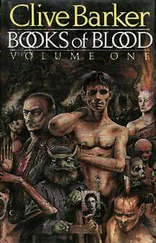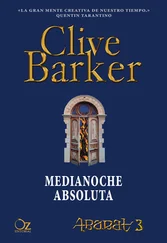Clive Barker - Mister B. Gone
Здесь есть возможность читать онлайн «Clive Barker - Mister B. Gone» — ознакомительный отрывок электронной книги совершенно бесплатно, а после прочтения отрывка купить полную версию. В некоторых случаях можно слушать аудио, скачать через торрент в формате fb2 и присутствует краткое содержание. Год выпуска: 2008, ISBN: 2008, Жанр: Ужасы и Мистика, на английском языке. Описание произведения, (предисловие) а так же отзывы посетителей доступны на портале библиотеки ЛибКат.
- Название:Mister B. Gone
- Автор:
- Жанр:
- Год:2008
- ISBN:978-0-06-018298-4
- Рейтинг книги:3 / 5. Голосов: 1
-
Избранное:Добавить в избранное
- Отзывы:
-
Ваша оценка:
- 60
- 1
- 2
- 3
- 4
- 5
Mister B. Gone: краткое содержание, описание и аннотация
Предлагаем к чтению аннотацию, описание, краткое содержание или предисловие (зависит от того, что написал сам автор книги «Mister B. Gone»). Если вы не нашли необходимую информацию о книге — напишите в комментариях, мы постараемся отыскать её.
Mister B. Gone — читать онлайн ознакомительный отрывок
Ниже представлен текст книги, разбитый по страницам. Система сохранения места последней прочитанной страницы, позволяет с удобством читать онлайн бесплатно книгу «Mister B. Gone», без необходимости каждый раз заново искать на чём Вы остановились. Поставьте закладку, и сможете в любой момент перейти на страницу, на которой закончили чтение.
Интервал:
Закладка:
And so I turned one last corner and came into the street where Johannes Gutenberg, the most noted goldsmith in Mainz, had his workshop.
It was a commonplace building on a commonplace street, and had it not been for the powers congregating there I would not have looked twice at it. But there was no doubt that this unremarkable place contained something significant. Why else would agents of Heaven and Hell be locked in such brutal combat on the roof, and in the air above the roof, where they tumbled over and over, forms of sun and shadow, wrapped around one another. These weren't performances, they were life or death struggles. I saw a demon of no little magnificence drop out of the sky with the top half of its head sheared off by an angel's sword, another torn apart by a gang of four heavenly spirits, each taking a limb. There were other forces battling at far higher altitudes, lightning strikes leaping from cloud to cloud, and flayed anatomies descending in rains of excrement and gold. The citizens of Mainz showed a stubborn refusal to see what was going on above. Their only concession to the fact that today was not like any other was their silence as they made their way past the Gutenberg workshop. They studied their muddy feet as they trudged by, their faces wearing expressions of fake intent, as though their purposefulness would protect them against any kind of rain, sulfuric or seraphic.
I had no more interest in the outcome of these battles than they. What did it matter to me whether Heaven or Hell carried the day? I was my own force on this crowded battlefield: a captain, a soldier, and a drummer boy in an army of one.
That is not to say I would not take advantage of any opportunity the battle might present me with, the first of which came when I climbed the three stone steps that led up from the filth of the street to the workshop door. I rapped on the door with my knuckles: three neat taps. The door remained closed. I was tempted to unleash against it the powers that were fermenting in me, powers I swear had doubled in strength every time I had turned a corner and came closer to this door. But if I did so, then the warring factions would know I was of their number, and I would surely be commandeered by Hell, or assaulted by Heaven. Better they took me for a burned wreck of a man, begging at a goldsmith's door.
After a time I knocked again, only instead of rapping politely with my knuckles I beat on it with the side of my fist. Nor did I stop this tattoo, but kept on beating and beating until finally I heard the bolts on the door being slid aside, top and bottom, and the door was opened just wide enough for a man of perhaps twenty-five to peer out at me, his pale, lightly freckled face marked with streaks of black. Despite his warpaint, the sight of my own ruin of a face made him regard me with no little horror.
"We don't give to beggars," he said.
I replied with just five words. "I am not a beggar." But they emerged from me with such an authority that they astonished even me, their speaker. And if me, then how much more the man on the other side of the door? His hand, with which he had gripped the doorframe when he'd opened up so as to block my entrance, now dropped away, and his grey eyes filled with grief.
"Is it the end?" he said.
"The end?"
"It is, isn't it?" the man said.
He stepped away from the door, and as though owing to the simple fact of my presence at the threshold the door swung open, showing me the retreating young man, a knife dropping from the hand he'd had out of sight behind the door, and the passageway down which he was running, which led to a large well-lit room where several men were at work.
"Johannes!" the young man called back to one of their number. "Johannes! Your dream! Oh Lord in Heaven! Your dream!"
I was, apparently, expected.
I won't mislead you and claim I was not surprised. I was, mightily. But just as I had learned how to perform passably as a human being, so it was no great hardship now to act like a visitor — whether I was expected to be human or not I neither knew nor cared — whose imminent arrival had been anticipated.
"Close the door," I called out to the young man. Again my voice carried the power of an imperative that would not be contradicted. The young man dropped to his hands and knees, turned and crawled past me, his head bowed, his eyes averted, and pushed the door closed.
I had not realized until the door slammed shut how significant this house, where Gutenberg worked his secret work, had become. Here, perhaps, I would have the question that troubles all of us, if we were truthful, answered: Why am I alive? I didn't yet have that answer, but thanks to the few words I'd heard spoken here I was filled up with a light-headed sense of joy. That though the journey here had been long and that more than once I had despaired of ever discovering what purpose I served that here, under this roof, was a man who might relieve me of the soul-rotting fear that I served none at all: Johannes Gutenberg had dreamt of me.
"Where are you, Johannes Gutenberg?" I called to him. "We have some business, I believe."
In response to my call, an imposingly tall, expansive-shouldered man with a long broad head of iron and salt stepped into view. He stared at me with bruise-bagged, bloodshot, yet presently astonished eyes.
"The words you utter," he said, "they're the same words you spoke in my dream. I know because when I woke I asked my wife what you might mean by unfinished business. I thought perhaps we'd forgotten to pay some bills. She told me to go back to sleep and forget about it. But I couldn't. I came down here, to the very spot where I had dreamt I was standing when you came in, and where I now stand."
"And what did you say to me in your dream?"
"I said welcome to my workshop, Mr. B."
I inclined my head slightly, as though making the subtlest of bows. "I am Jakabok Botch."
"And I am — "
"Johannes Gutenberg."
The man made a small, quick smile. He was clearly nervous at my presence, which was appropriate. After all, it wasn't some common official from the guilds of Mainz who had come knocking at his door, wanting ale and gossip. It was a dream that had strayed from the sleeping world into that of the woken.
"I mean you no harm, sir," I told him.
"That's easily said," Gutenberg replied. "But harder to prove."
I thought about this for a moment, then, moving very slowly so as not to alarm anyone, I bent down and picked up the knife the young man had dropped. I proffered it to him, handle first.
"Here," I said. "Take it. And if I should do or say anything that troubles you, slice off my tongue and prick out my eyes."
The young man didn't move.
"Take the knife, Peter," Gutenberg said. "But you'll have no need of slicing or pricking."
The young man took back his knife. "I know how to use it," he warned. "I've killed men."
"Peter!"
"I'm just telling him the truth, Johannes. You're the one who wanted this house made into a fortress."
"Yes, that I did," Guttenberg replied, almost guiltily. "But I have much to protect."
"I know," Peter said. "So why are you letting this, this creature in?"
"Don't be cruel, Peter."
"Would killing him be cruel?"
"Not if I deserved it," I interjected. "If I meant harm to anyone or anything under this roof, then I would think you perfectly within your rights to cut me from groin to gullet."
Young Peter looked at me with bewilderment, his mouth opening and closing as though some reply was imminent, though none was forthcoming.
Gutenberg had something to say, however. "Let's not talk of death, not with so much we two have dreamt of finally in sight." He smiled as he spoke, and I got a glimpse of the younger, happier man he had once been, before his invention and the demands of keeping it from being stolen or copied had made him into a man who slept too little and feared too much.
Читать дальшеИнтервал:
Закладка:
Похожие книги на «Mister B. Gone»
Представляем Вашему вниманию похожие книги на «Mister B. Gone» списком для выбора. Мы отобрали схожую по названию и смыслу литературу в надежде предоставить читателям больше вариантов отыскать новые, интересные, ещё непрочитанные произведения.
Обсуждение, отзывы о книге «Mister B. Gone» и просто собственные мнения читателей. Оставьте ваши комментарии, напишите, что Вы думаете о произведении, его смысле или главных героях. Укажите что конкретно понравилось, а что нет, и почему Вы так считаете.











